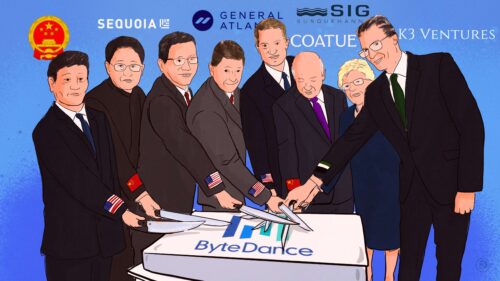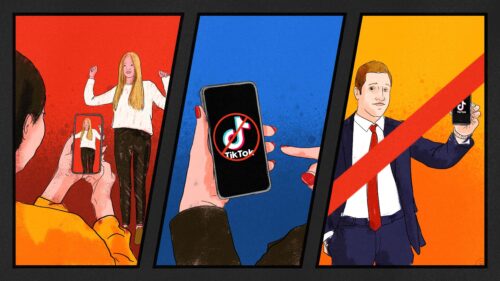TikTok’s hard lesson in the drawbacks of ‘996 culture’
How did ByteDance, the face of China's global tech ambitions, become a cautionary tale about "toxic" work culture?

Earlier this month, Financial Times reported that TikTok Shop, the livestream ecommerce arm of ByteDance’s viral video app, had experienced a staff exodus in Britain and elicited a torrent of complaints about heavy-handed workplace management.
Accusations directed at ByteDance include, among other things, subjecting employees to overtime work, setting “unrealistic” sales goals, naming and shaming staff for failing to meet targets, and selling low-priced knockoffs.
Among the people singled out was Joshua Ma, head of TikTok Europe, who said at a dinner that as a “capitalist,” he “didn’t believe” companies should offer maternity leave. The irony is that this came as Britain, a bastion of capitalism, was piloting a four-day workweek.
I have no idea of the circumstances surrounding Ma’s comment. Did he make it in earnest or in jest? Or perhaps over a drink too many? No matter the answer, that China’s most globalized internet firm should stumble this badly is mind-boggling.
Ma’s faux pas and the subsequent furor that engulfed ByteDance is emblematic of the risk-laden business climate China Inc. finds itself in. A gaffe could easily negate past achievements and squander goodwill and hard-won gains. The stakes are indeed high.
Tempting as it is to blame this episode, as some did, on “a culture clash,” or a hamfisted attempt to export “involution” — a byword for dog-eats-dog competition in China — this interpretation scratches the surface. A more plausible explanation is that it epitomizes what I call “elite egoism.”
I don’t mean in any sense to exculpate 996 work culture and those behind it. But it’s telling that the harshest criticism of 996 —referring to 9 a.m. to 9 p.m, six days a week — comes from the media, the public, and employees at the bottom of the pecking order, rather than from “elites” in the top echelons, who are its most fervent adherents.
One may wonder if these people are masochists, but the truth is that they have learned to “lift work itself to the rank of supreme and most satisfying entertainment,” according to the late sociologist Zygmunt Bauman in Work, Consumerism and the New Poor.
For executives who build their success on sweat, lengthy work hours, and chronic sleep deprivation, celebrating the blurring of life and work serves primarily to flatter the vanity of workaholics who take this label as a badge of honor.
Critics of 996 often point to its exploitative nature, but this is not the full picture. Chinese staff are as averse as their foreign peers to overtime, and while financial motivations do incentivize hard work, it’s only up to a point. What makes 996 endure is that it empowers those who survive it, arming them with the justification to perpetuate a vicious cycle.
As Bauman argues, “Workaholics with no fixed hours of work, preoccupied with the challenges of their jobs twenty-four hours a day and seven days a week, may be found today not among the slaves, but among the elite of the lucky and successful.”
When the ethos of today’s voluntary “slaves” commingles with the ruthless pursuit of efficiency, for which Chinese internet companies have become infamous, they produce an odd combination — a holier-than-thou attitude that verges on a missionary mentality.
Long gone are the days when Chinese firms were receptive to foreign wisdom. A large number of internet company CEOs I spoke to were quick to crow about their technical competency and operational efficiency, convinced that they can give global titans a run for their money.
Having had their share of lectures, Chinese tech moguls now figure it is now their turn to speak. Employees who fail to be converted by the gospel of work-induced gratification are relegated to the status of second-class corporate citizens.
The fact that TikTok has taken the world by storm has only fueled this missionary mentality. But if left unchecked, this mentality could spell doom for Chinese companies with overseas ambitions. Even if firms manage to avoid regulatory scrutiny, managers may struggle in markets where locals will not willingly sacrifice themselves on the altar of corporate profits.
Zhāng Yīmíng 张一鸣, the founder of ByteDance, is well aware of the danger of stubbornness. In 2020, when the Trump administration pressured TikTok to divest its U.S. business, he penned an internal letter emphasizing the need for a “Martian” perspective.
“If we don’t take the Martian perspective, we’ll inadvertently offend the cultures and values of different countries at work, or foist our habitual standards on colleagues from a distinct cultural background,” Zhang wrote. “That is why we included ‘diversity’ into ByteDance’s corporate culture.”
He made a string of key appointments that emphasized localized management, requiring less influence from the headquarters. But the latest backlash against TikTok suggests that Zhang still has a long way to go.
If ByteDance does learn its lesson and implements pro-diversity schemes, it may yet repair the damage and win over the hearts and minds of international employees, given just how immensely popular its app is. Likewise, the TikTok saga should prompt Chinese business owners to think if their organizations have a similar problem, and what can be done about it. They’ll not arrive at an answer by working harder.






